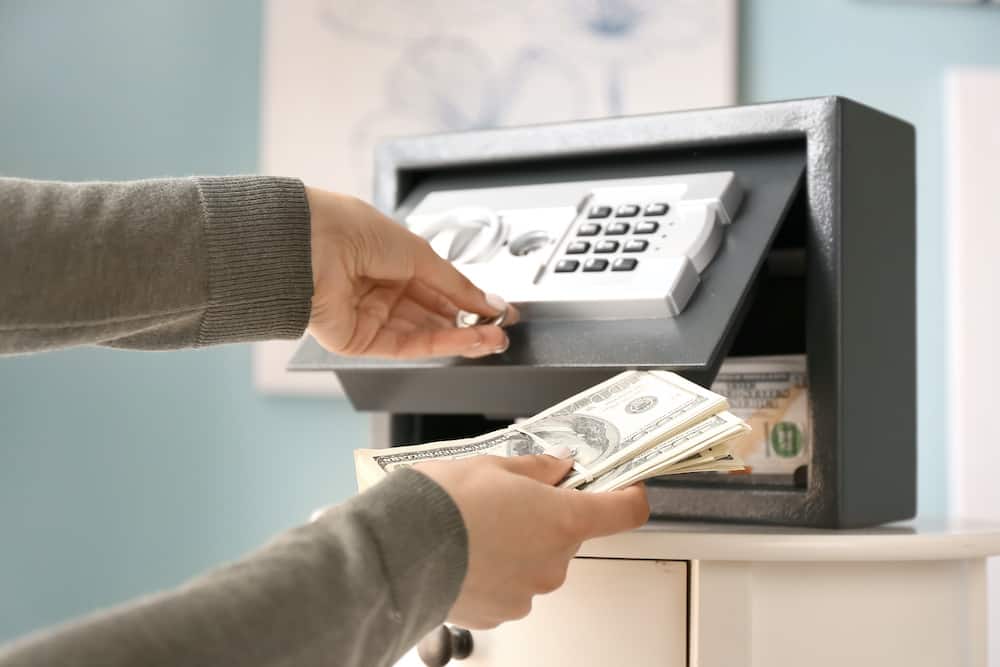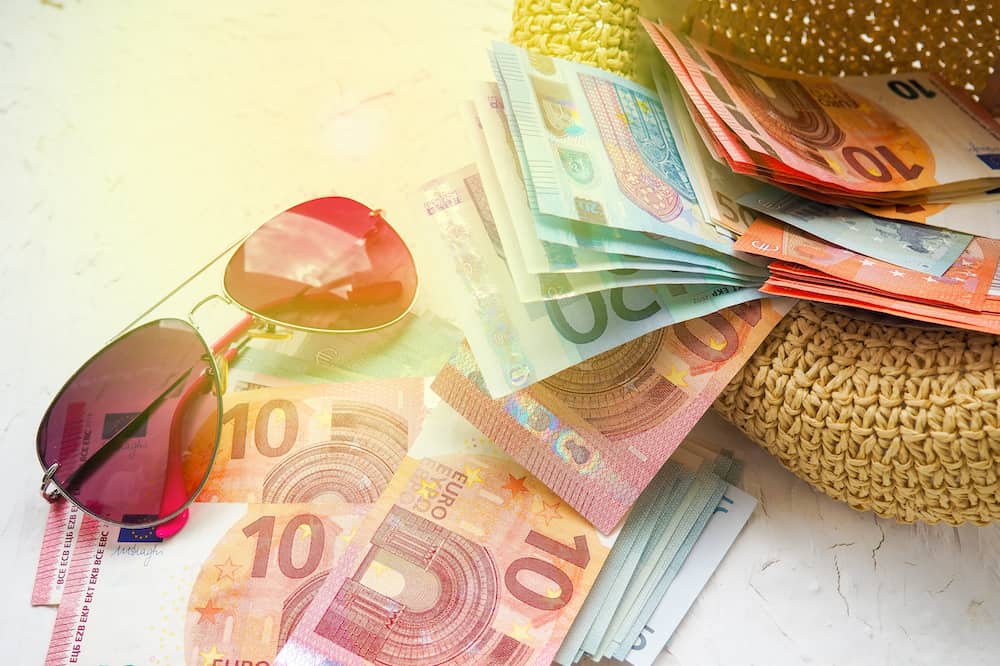Last Updated on October 25, 2023 by Greg Head
How Much Cash Can You Travel With. If you’re off to see the rest of the world, then you can’t do it without cash. Like the rest of the stuff you’re packing for your trip, cash is also something you have to plan.
Frequent travelers would recommend keeping a modest amount of cash on you for emergencies. After all, you can always use your card for other purchases.
The question of how much cash can you travel with varies depending on your destination.
In countries like Cuba, for instance, you won’t be able to use your American ATM and credit cards, so you may have to carry a bit more cash than you’d like.
In any case, cash is necessary, and you won’t be able to enjoy your trip as much without it.
Aside from the country you’re flying to, your country of origin would also determine the amount of cash you can carry on an airline.
Things You Need for Safety on the Road
How Much Cash Can You Travel With
Legally speaking, there usually aren’t any limits when it comes to the amount of cash you can fly with.
However, if you’re traveling abroad from the USA, you’ll need to declare amounts of more than 10,000 dollars on your customs form.
You should also expect officials in charge, including law enforcement, to be hounding you with questions about the amount of money you’re carrying.
If you have a good explanation for why you’re bringing that much cash with you, then you shouldn’t have to worry about anything.
Cash and the Transport Security Administration (TSA)
While there is no legal stipulation when it comes to the amount of cash you can carry on a flight, you still have to consider the TSA checkpoint.
You may be asked by the TSA to explain the unusual amount you’re carrying while being closely scrutinized throughout the entire thing.
In this nerve-wracking scenario, law enforcement might misinterpret some of your words and actions as lies and suspicious behavior, respectively.
This could, in turn, lead them to seize your cash and question you even further.
You’ll want to prevent such a situation from taking place as much as possible.
Having tons of cash on your person or in your carry-on can lead people to think that you could either be smuggling them or dealing in drugs.
This would then call for the involvement of the Drug Enforcement Agency, who would be tasked to take away your cash.
So, basically, if you will bring a huge amount of currency on your flights, make sure your reason for doing so is legal and legitimate.
You also want to head to the airport earlier to give yourself more time in case they ask you for an explanation.
Where to Place Your Cash During Your Flight
If you’re not accustomed to bringing tons of cash with you, then you’re probably asking yourself: “Where else should I place my money?” .
If you’re thinking “your bags”, then no, that’s not the answer.
This is something you should strongly consider because word on the amount of money you’re carrying could possibly get out.
Someone close to you could divulge the information by accident or on purpose. Placing your money in checked bags is incredibly risky.
For one, your bags go through a couple of departments, and various individuals handle them.
If some of your money gets lost, you’re not only going to have a lot of trouble finding the culprit, but you could also miss your flight and ruin your entire trip. Plus, who wants to travel with no cash?
Pockets
Another option is carrying cash on your person. In this case, be prepared to endure some pat-downs and additional screenings by some overzealous officers of the Transportation Security Administration.
Carry-On Luggage
Arguably one of the best options you have is to place your money in your carry-on. Just secure your bag with a lock approved by the TSA.
Also, always make sure it is kept on sight and within your reach.
If you’re required to go through a secondary screening, inform the agents that your bag contains cash, and you need to keep watch over it throughout the entire duration of the screening.
Otherwise, when your bag isn’t being checked, keep it secure and close to you at all times. Never put money in baggage you intend to check or in luggage that you won’t be in control of at all times.
Money Belt
A money belt is also a good way to carry cash. Once you’ve passed through security, get inside a cubicle in the restroom and start placing your cash in the money belt.
How to Keep Your Money Safe During Your Trip
When it comes to traveling, never keep all your money in a single place.
Put in Secure Bag and Clothing Compartments
Zippered pockets and bags, as well as other secure compartments, would all be ideal areas for storing some of your travel cash.
Fail to do this, and you could be setting yourself up for disaster in a foreign land.
Only Carry Enough Money for the Day
Divide your money well, and you should be able to conquer anything on the road. The cash you keep on your person should be enough for that particular day’s budget.
As for the rest of your money, keep it locked up in the hostel.
Never Leave It Out in the Open
The money you keep on you should be kept as close to you as possible. You don’t want to leave it out in the open for all the prying eyes to see.
Remember that you’re new to this environment, and locals are going to be curious about you.
Carrying a lot of money with you will attract attention, for sure. More than that, it will attract the wrong kind of attention, so make sure to avoid doing it as much as possible.
In a nutshell, when keeping your money on your person, you want to place it somewhere secure, safe, and immediately accessible.
From your shoes, socks, and money belts to your bra cups and zipper trouser compartments, there are several appropriate areas for storing your cash.
Here some of your other options:
- Hidden compartment on your scarf
- Hidden wallet on your security belt
- Leg money belt
- Hidden pockets
Purchase a Lock
All the valuables inside your private room should be kept safe. They should be kept inside the lockers and safes provided by the hostel.
Furthermore, you’ll want to purchase an extra padlock to really amp up the security level. It would be wise to choose a combination padlock since this would eliminate the possible issue of losing your key.

Leave It in Your Car
If you go on a camping trip, you might need to bring some extra cash with you. Make sure to leave your money and other valuables in places that aren’t too obvious.
Under the car seat and inside the glove compartment are poor hiding spots because they would clearly be the first places thieves check out.
Get creative when hiding valuable stuff in your car. Put your mind to it, and you should be able to figure this one out easily.
Here are some potential hiding places inside your car:
- Under the floor mat
- Inside a ziplock in the cooler (keep the cooler in the back trunk)
- Between the back of the seat and the seat cushions
- Secret compartments
How to Ensure You Have Enough Money During Your Trip
Now that the airport officials have successfully cleared your cash, it’s time for you to go and really begin your trip.
But not so fast! Before you go and do that, you want to keep some tips in mind for keeping your money safe.
Whether you’re driving down Route 66, trekking up the Himalayas, or backpacking across Europe, you will need cash.
After all, as awesome and freeing as traveling is, it does cost money. If you lack cash, your travels would be cut short or you wouldn’t be able to travel at all.
So many of the sights you want to visit, and the activities you want to do would be inaccessible if you overspent or lost your wallet.
Cash not only adds fun and excitement to your trip, but it also ensures you’re secure in the event of an emergency.
We’ve got a great guide below on how to keep your money safe while traveling.
Some of these tips can help protect you from pickpockets, prevent misplacement of wallets, and other incidents that could end in you losing most of your dough.
Inform Your Bank
This is something you should set your mind on before you begin globetrotting. Make sure to keep your bank in the know about where and when you’re traveling.
They also need to know how long you’ll be gone. There’s a tendency for your account to be frozen if the bank notices a long period of inactivity.
This is actually a great security measure and shouldn’t be an issue when you keep your bank in the loop; otherwise, it can end up ruining your long vacation entirely.
You’ll want to talk to the manager about setting up daily withdrawal limits to prevent any fraudulent activity from taking place in case your card gets stolen.
This also prevents any overspending on your end, which almost always leads to a complete depletion of funds.
Jot Down Contact Details
You may be off to an adventure that entails temporarily removing yourself from your hometown physically and emotionally, but that doesn’t mean you should cut contact with your bank.
If you want to end up surviving your soul-searching endeavor, make sure to have a record of your bank’s contact details, preferably in the form of a physical document you can tuck away somewhere safe.
In this way, if you encounter any problems in foreign lands, you can immediately get in touch with your bank.
Prepare a Contingency Plan
Leave a loved one or neighbor some money behind before you fly out.
Uncertainties can happen at any time, and you might find yourself in a situation that requires asking these people to wire some money out to you as a favor.
This is one base you should definitely have covered.
Also, if something does end up happening, you should be able to get your cash without waiting too long.
If you don’t actually end up putting the contingency plan into action, then you’ll have some nice savings for when you get back home.
Exchange Some of Your Money for Local Currency
Make it a point to have cash in the currency of the country you’re traveling to. It wouldn’t be advisable to do this upon landing because then you’d have to figure out where to do it.
Additionally, you would be tired and would much rather head to your hotel as soon as you land.
It pays to have some cash in the local currency on hand so that you minimize your hassles on the first day.
Copies, Copies, Copies
Never forget to make copies of anything important, especially concerning your finances. If you lose your wallet, having a copy of your bank card can literally save your life.
It’s not enough that you just take a photo of your card.
You have to make sure this picture clearly displays all the important details, such as the card number, date of expiry, and account number.
This way, even if you’re not able to make cash purchases, you can still buy some necessities online.
There are reliable apps for storing soft copies of documents. Download them on your phone and save everything you deem necessary and important.
If the above option doesn’t work for you, then there’s always the trusty pen and paper method.
Never Leave Belongings Unattended
This is one of the more obvious tips that you aren’t likely to forget, but it doesn’t hurt to keep on emphasizing this again and again.
Having the time of our lives, we sometimes tend to lose sight, and we mean this in the most literal sense, of the essential things, your money belt being one of them.
You can so easily get distracted when talking to new friends and end up forgetting where you left some of your stuff.
Zippers Are Important
Any compartment that has no zipper is not a place for your wallet or money pouch. You can get so comfortable in your new environment that you no longer think about heightening your security measures.
Always remember that, at the end of the day, you’re not at home, and that makes you an easy target.
Vary Your Money
Sure, you want to exchange your money for the local currency, but you shouldn’t limit the exchange to bills.
It helps when you vary your cash as much as possible, putting an assortment of coins as well as small and large notes inside your money belt.
Keeping a variety of cash helps ensure that you’re ready to pay for anything, from gelato sold by a street vendor to some of the finest courses in the local restaurant.
Keep Some Must-Have Currencies
We’re talking about the hard currencies, such as Dollars, Pounds, and Euros. There’s almost no chance this kind of money doesn’t get exchanged.
Keep a wad of these bills inside the secure compartment where you store your passport and other essential documents.
Cash or Card
There are countries where it would be better to bring cash, like Cuba, and others where it would be ideal to use cards. Fortunately for modern travelers, there’s a complete range of payment methods to take advantage of.
In this way, booking restaurants, hostels, and tours are just that bit easier.
In cases where you prefer card transactions, make sure your phone is secure so that only you can have access to your money.
You’ll also want to stay updated on the best and latest payment technology before you go on a spending spree.
How to Avoid Trouble
So you’re in a completely new environment with new people and feel like showing off—not a good idea! Being flashy could lure unwanted attention of the worst kind.
Whenever you’re out, never draw attention to yourself. Keep your money out of sight and avoid wearing jewelry.
If possible, don’t bring any jewelry with you on your trip, and if you need to, leave them at the hotel safe. Pickpockets are potential problems you could encounter when visiting a destination.
If a crime is a common occurrence in this area, you’ll want to carry a dummy wallet with a bit of cash inside it.
You can hand this over instead of your real wallet to save yourself from harm and leave most of your cash untouched.
How Much Cash Can You Bring Traveling
If you absolutely need to bring a large amount of cash with you, make sure to prepare a valid explanation for the TSA officers who will be questioning you.
You must be able to convince them that your intentions are true and legal; otherwise, you might as well not travel in the first place.
Generally, the question of how much cash can you travel with is ultimately determined by the rules set by your country and destination.
After you have this sorted out with research, you can then apply the necessary tips to keep your cash safe and yourself away from danger.
Get a Frequent Flier Miles Credit Card
Under normal circumstances, I wouldn’t encourage anyone to get a credit card just for the card member perks.
But when you start to add up how much checked luggage fees can cost for frequent travelers, it makes sense for many people to do what they can to avoid the extra fees.
With Delta’s SkyMiles credit cards, you get one checked bag per person for each flight. I really like that you don’t even have to use your card to book your ticket to get the free first checked bag.
Additionally, you can use the benefit for up to 9 people when they’re traveling under the eligible card member’s reservation.
United offers a similar program with the United MilagePlus Explorer card.
Most of these cards do have annual fees attached, so you’ll want to make sure that you’re using your card enough to actually save money.
If so, frequent flier miles cards are a great way to avoid airline baggage fees, especially if you frequently fly the same airline.
Traveling With Cash
Long gone are the days when Traveler’s Cheques were commonplace. Now can mostly use credit cards to get from home to our destination while relying on just a few hundred in cash reserves.
Using a money belt, security wallet, and being mindful, will help keep you safe.
Always keep money in separate places — don’t reveal your wad of cash when paying the taxi driving or tipping someone. Keep some you can access for these situations and another stash somewhere else in your backpack.
Consider also having muggers money set aside should you need to use it.

